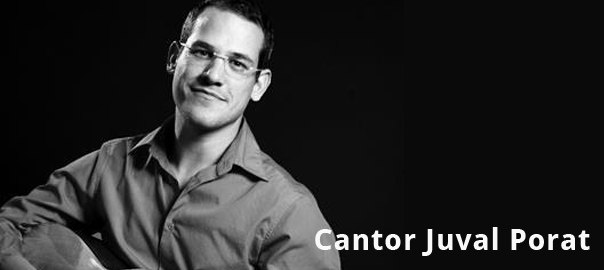Queer Jewish Clergy Retreat Offers New Spiritual Insights

Cantor Juval Porat attended Nehirim’s first LGBTQI Jewish clergy retreat in December 2014, and shared his experience in his Cantor’s Column in the latest issue of G’vanim.
In 2009, as my studies at the Abraham Geiger College drew to a close and my ordination was approaching, I found myself sharing my story often with the German media. “First trained Reform cantor in Germany since World War II” was a title they seemed very curious about. I never thought of mentioning my sexual orientation, as I never thought it mattered. I remember my irritation reading about my “soft features” in an article, which I
assume was intended to describe my body language.
Was “soft features” a way of suggesting I was effeminate and perhaps gay? I realize that beyond my sexual orientation being irrelevant to my ordination and my profession, its potential revelation stirred up a wound of shame and sorrow I wasn’t quite ready for. I wrote an abbreviated form of this insight on a piece of butcher paper taped along a wall of Congregation Sha’ar Zahav in San Francisco in early December during Nehirim’s first LGBTQI Jewish clergy retreat. Rabbi Lisa Edwards and I were there among 64 rabbis, cantors, students and others. In the four days I spent there, I felt pushed out of my comfort zone, comforted by likeminded souls, amazed by queer text interpretations, and transported by original forms of liturgy. Mostly I felt in touch with seeming contradictions – the joy of living in a time and place of freedom, contrasted with the sadness of those who have been excluded as clergy because of their sexual preference.
Having grown up with traditional liturgy and often being nervous about modifications of the Hebrew, I felt a surprising connection to the queer Amidah (silent prayer), as formulated by the creative writers of Sha’ar Zahav’s own prayer book, acknowledging God as the one “in whom are united all separations…queer ourselves, made of heaven and earth, day and night, female and male.”
I experienced the wonder of living in a time and place in which our trans-brothers and sisters might consider our ancestors Abraham and Sarah as genderfluid, transitioning towards their most authentic selves. You might raise an eyebrow or two (or not, and congratulations to you for that!) while trying to wrap your mind around the idea of Abraham and Sarah being in transition, but an actual midrash (exegesis of Torah texts) in the Talmud (tractate Yevamot 74:A-B) suggests just that!
I experienced the power of living in a time and place in which we can discuss BDSM (bondage, discipline, sadomasochism) as a possible spiritual practice, or the blessing for unexpected intimacy found in Sha’ar Zahav’s prayer book and originally a blessing for anonymous sex. The blessing suggests that, just like Jacob, “who has encountered a stranger with whom he grappled all night,” who “never knew the stranger’s name, yet their encounter was a blessing,” we too can find blessings in intimate times with another person, possibly a stranger, “turning strange places into holy
ground and strangers into a source of blessing.” The attempt to elevate unexpected encounters into something spiritual and the process of integrating that into the prayer book, as told by Rabbi Camille Angel and Maggid Andrew Ramer, moved me immensely and I couldn’t help but feel awe for being part of a community that fosters a more compassionate humanity by offering such insights.
I haven’t yet processed music’s facilitative power in a gathering such as the LGBTQI retreat, but based on the closing song session, in which we chanted “Hineh Ma Tov” (How good it is) for achim (brothers), achayot (sisters), and kulanu (and all of us) to be in one space together, or my I-kissed-a-girl-and-I-liked-it-niggun (yes, that happened). I can’t wait to further utilize music for future retreats.
There’s so much more to share, but I’ll leave you with that. It’s Hanukkah, as I write these lines – another opportunity to look at our contrasts and contradictions. On the one hand we light candles in memory of a miracle and a victory over oppression, brought by the war of the Maccabees against the Syrians, and on the other hand we read the words of Zechariah in the Hanukkah haftarah that neither might, nor power, but
spirit alone will lead to real peace.
I also wonder whether there’s a difference between a blessing and a miracle. Looking back at the retreat, having experienced the blessing of being in an open, safe and compassionate place and time, I’d like to believe that it’s up to us to nurture those blessings into miracles. And perhaps our inner contradictions – the sadness and the joy, the peace and the terror, the mundane and the religious — can serve us as a source of strength rather than tension as we reveal ourselves as LGBTQI Jews in our lives and communities.
B’shalom,
Juval




